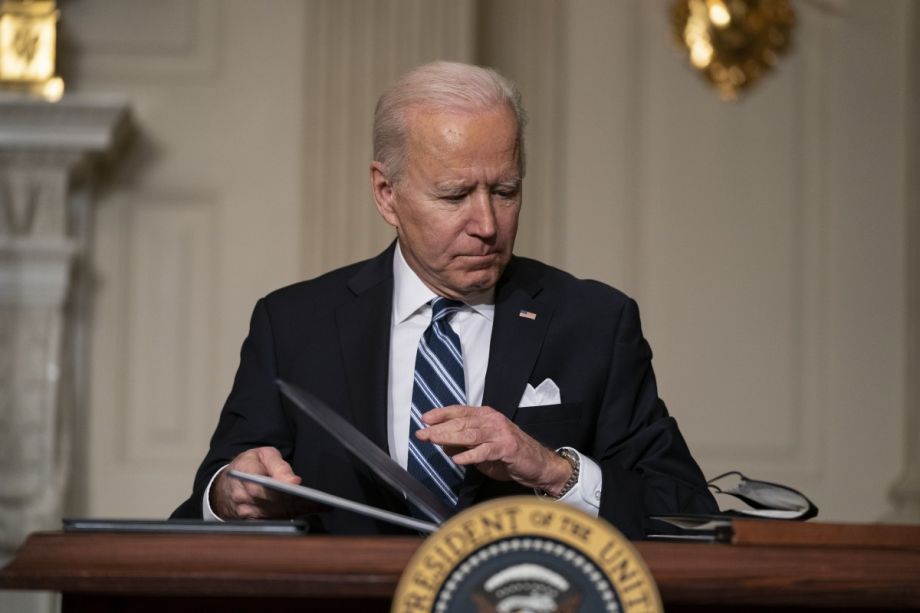

In this Jan. 27, 2021, file photo President Joe Biden signs a series of executive orders on climate change, in the State Dining Room of the White House in Washington. (AP Photo/Evan Vucci, File)
Biden Administration Releases Plans to Cut Homelessness 25% by 2025
On Monday, the Biden administration released a plan to reduce homelessness nationwide by 25% over the next three years. The plan was developed by the U.S. Interagency Council on Homelessness, a body that coordinates across 19 federal agencies to end homelessness. The plan leans heavily on a “housing first” strategy, or providing immediate housing to people experiencing homelessness so that they can stabilize and address other needs, including lack of employment, mental health or substance abuse. It calls on states on cities and states to use American Rescue Plan and CARES Act funding to rehouse people or prevent homelessness. The administration plans to increase the supply of permanent supportive housing and will urge states and cities to streamline the production of affordable housing.
The plan was met with optimism from some homelessness nonprofits, including the National Alliance to End Homelessness, whose CEO Ann Oliva said in a statement that it is “fundamental for turning the tide on the crisis of homelessness in America.”
The plan arrived just as the Department of Housing and Urban Development (HUD) released data showing homelessness increased since 2020, but at a much smaller rate than was predicted. HUD’s Annual Homeless Assessment Report shows that on a single night, 582,462 were experiencing homelessness. That’s an increase of 0.3% since 2020, a jump many expected to be higher due to economic strain and dislocation from the pandemic.
Unsheltered homelessness, however, jumped at a faster pace than homelessness overall, rising 3.4% since 2020. Chronic homelessness – which HUD defines as a person with a disability who has been homeless for a year or more – jumped 15.6%. Family homelessness dropped 6%, veteran homelessness dropped by 11% and youth homelessness dropped by 12%.
Congress Unveils Omnibus Spending Bill
Congressional leaders reached a deal on a massive omnibus spending bill for 2023 which will include many increases for housing and homelessness services. The bill, likely to be signed by President Biden this week, provides HUD with $8 billion in additional funding compared to the final 2022 budget, according to an analysis by the National Low Income Housing Coalition.
NLIHC created a chart to show how housing programs are being funded compared to 2022, and most saw an increase. An exception is the public housing capital fund, which faces an $8 million decrease. This is despite a backlog of at least $70 billion in capital repairs for public housing across the country, including an estimated backlog of $40 billion in NYCHA alone. Public housing funds were also left out of the Inflation Reduction Act passed earlier this year, despite being included in the abandoned Build Back Better Act.
The spending bill creates a new $225 million program to support manufactured home communities, called the Preservation and Reinvestment Initiative for Community Enhancement (PRICE) program. (Manufactured homes were once called mobile homes, a misnomer as they are difficult to move.)
The bill will also provide $85 million in competitive grants to incentivize inclusionary zoning in an effort to get more housing built. And it expands Housing Choice vouchers to an additional 12,000 people who are low-income or at risk of homelessness.
L.A.’s New Mayor Ramps Up Homelessness Plan
As we noted last week, Los Angeles’ newly-elected Mayor Karen Bass immediately declared homelessness an emergency upon taking office. This week, she provided some more details about how she’s going to address the crisis.
Bass ordered the departments responsible for approving new shelters and affordable housing to fast-track applications, according to the L.A. Times. Approvals will now take 60 days instead of six to nine months. This applies only to projects with 100% affordable housing – these developments will now longer require a lengthy review, including public hearings and environmental reviews, according to The Real Deal.
Bass also spoke more about a plan to lease motel and hotel rooms for unsheltered people, which she said would consist of outreach workers offering rooms to people living in encampments. Bass spoke about the program on Meet The Press this week, where she said organizations have been trying to get the city to master lease hotels and motels for years.
When asked if she planned to do homeless sweeps, Bass told host Chuck Todd, “These are not sweeps at all. This is getting people to move on their own.” Bass went on to say that her approach would not rely on ticketing or incarcerating people.
This article is part of Backyard, a newsletter exploring scalable solutions to make housing fairer, more affordable and more environmentally sustainable. Subscribe to our weekly Backyard newsletter.
















